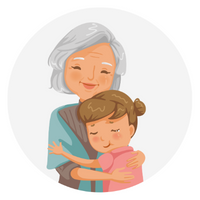Disclaimer: Devoted Grandma is reader-supported. If you purchase anything through my site, I may receive a small commission (at no cost to you). Thank you.

As grandmothers, we’ve all felt that warm glow of a grandchild’s hug or the joy of holding their tiny hands. However, not all children express or receive love in the same way. Understanding a child’s unique love language can deepen the bond you share, but it can also reveal that physical touch might not be the best way to connect. If your grandchild’s love language isn’t physical touch, it’s essential to recognize and honor that. Here are 15 signs to help you identify if physical touch isn’t their preferred way of feeling loved:
1. They Avoid Hugs and Kisses
When you lean in for a hug or kiss, they might shy away or turn their head. It’s not about you—they may simply not find physical contact comforting. This can sometimes feel disheartening, but remember, their avoidance is not a reflection of your relationship.
2. They Prefer Their Personal Space
Your grandchild might keep a physical distance during family gatherings or when spending time together. They may gravitate toward their own chair or stay on the other side of the room. Their need for personal space might also extend to how they interact with others, so observing them in different environments can provide further clues.
3. They Seem Uncomfortable with Hand-Holding
If they pull their hand away when you reach out to hold it, it’s a sign they’re not at ease with this form of closeness. While some children enjoy the comfort and security of hand-holding, others might feel confined or uneasy.
4. They’re Content with Verbal Reassurance
Rather than needing a comforting touch, they might find words of affirmation or encouragement more fulfilling. A simple “I’m so proud of you” or “You’re doing great” can mean the world to them, more so than a hug or a pat on the back.
5. They’re Quick to End Physical Contact
A brief pat on the back might be fine, but they’ll move away if the touch lasts too long. For these children, physical contact might feel overwhelming or distracting, and they’ll instinctively pull away.
6. They Show Love Through Actions, Not Affection
Instead of hugging or cuddling, they might make you a card, help with chores, or share a story they wrote for you. These actions are their way of saying, “I care about you,” and they appreciate when you recognize their efforts.
7. They Avoid Sitting Close
Whether on the couch or at the dinner table, they’re more likely to choose a seat with some distance. Even during family movie nights, they may prefer to sit in a separate chair or on the floor instead of snuggling on the sofa.
8. They’re Not Enthusiastic About Cuddling
Some children love snuggling up to watch a movie, but others might squirm or ask to sit by themselves. For them, cuddling might feel intrusive rather than comforting, and they’ll make their preferences known.
9. They Use Words More Than Gestures
If your grandchild says “I love you” often but doesn’t follow it with a hug or kiss, their love language might be more verbal than physical. They’re telling you how much they care in the way that feels most natural to them.
10. They Enjoy Independent Activities
A grandchild who’d rather read, draw, or build something on their own might be signaling that they value emotional connection over physical closeness. Their independence is not a rejection but a reflection of their comfort with self-expression.
11. They React Negatively to Playful Touch
Tickling, roughhousing, or even a playful pat might lead to irritation or withdrawal instead of laughter. For some children, these gestures can feel overwhelming or even invasive, and they’ll communicate this through their reactions.
12. They Don’t Seek Out Physical Comfort When Upset
Instead of coming to you for a hug or sitting in your lap, they may prefer to talk, listen to soothing words, or have quiet time alone. Their way of processing emotions might be more internal, and they’ll appreciate your patience as they work through their feelings.
13. They Prefer Material or Quality Time Gifts
When receiving a present, they’re more excited about the thoughtfulness behind it or the time spent together than a hug that comes with it. They might treasure a shared activity or a gift that reflects their interests over physical gestures.
14. They Show Discomfort Around Crowds
If your grandchild avoids group hugs or seems uneasy in crowded, touch-heavy environments, it’s a strong indicator that physical touch isn’t their love language. They may feel overstimulated or out of place in situations where physical closeness is emphasized.
15. They’re Open to Other Love Languages
You might notice they’re much more responsive to acts of service, quality time, gifts, or words of affirmation—all signs their love language lies elsewhere. Observing what makes them light up can provide valuable insights into how they prefer to connect.
How to Adapt
Once you’ve identified that physical touch isn’t your grandchild’s love language, it’s important to respect their preferences. Love comes in many forms, and adapting your approach can help strengthen your bond. Here are a few ways to adjust:
Focus on Their Preferred Love Language
If they light up when you spend time together, plan special outings or activities. For example, a trip to the zoo, baking cookies together, or reading their favorite book aloud can create cherished memories. If they respond well to words, make an effort to praise and encourage them with heartfelt messages.
Celebrate Their Individuality
Each grandchild is unique, and understanding their love language is part of celebrating who they are. If they prefer quality time, ensure you’re fully present during your interactions. If they value acts of service, find small ways to help them, like assisting with a school project or organizing their room.
Ask for Their Input
If you’re unsure, ask your grandchild how they feel most loved. Even young children can articulate their preferences when given the opportunity. Questions like, “What makes you happiest when we’re together?” or “What’s your favorite thing we do?” can offer meaningful insights.
Keep Communication Open
Reassure them that you respect their feelings and want to make them feel loved in the way they’re most comfortable with. Let them know it’s okay to express their preferences and that you’re there to listen and adapt.
Build a Connection Beyond Touch
Physical touch is just one aspect of a relationship. By focusing on shared experiences, meaningful conversations, and thoughtful gestures, you can build a deep and lasting connection with your grandchild. Remember, love isn’t about what we prefer to give; it’s about how they prefer to receive.
Final Thoughts
Recognizing your grandchild’s love language is a wonderful way to show how much you care. If physical touch isn’t their preferred way of feeling loved, don’t take it personally. By paying attention to their unique needs and adjusting your approach, you’ll foster a relationship built on mutual understanding and respect. After all, the most important thing is that they feel loved, valued, and supported in their own special way.

